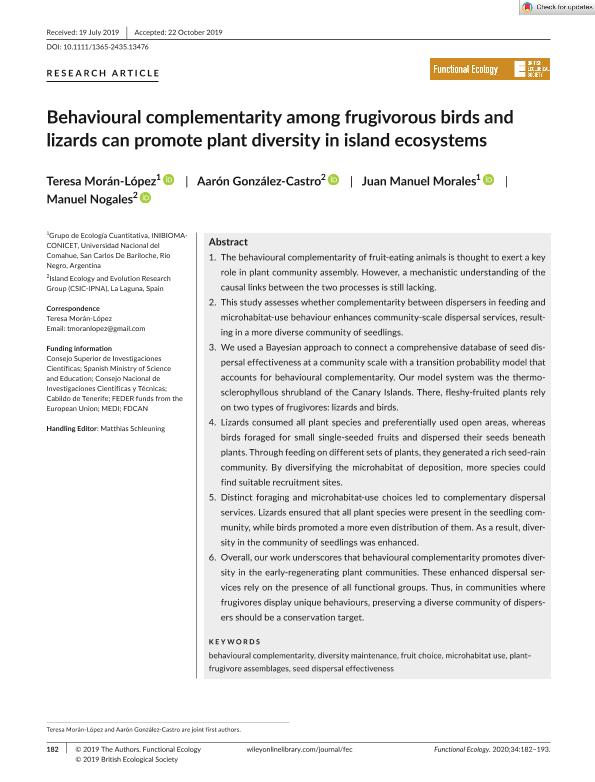Mostrar el registro sencillo del ítem
dc.contributor.author
Morán López, Teresa

dc.contributor.author
González Castro, Aarón
dc.contributor.author
Morales, Juan Manuel

dc.contributor.author
Nogales, Manuel
dc.date.available
2022-02-25T18:06:47Z
dc.date.issued
2020-01
dc.identifier.citation
Morán López, Teresa; González Castro, Aarón; Morales, Juan Manuel; Nogales, Manuel; Behavioural complementarity among frugivorous birds and lizards can promote plant diversity in island ecosystems; Wiley Blackwell Publishing, Inc; Functional Ecology; 34; 1; 1-2020; 182-193
dc.identifier.issn
0269-8463
dc.identifier.uri
http://hdl.handle.net/11336/152762
dc.description.abstract
The behavioural complementarity of fruit-eating animals is thought to exert a key role in plant community assembly. However, a mechanistic understanding of the causal links between the two processes is still lacking. This study assesses whether complementarity between dispersers in feeding and microhabitat-use behaviour enhances community-scale dispersal services, resulting in a more diverse community of seedlings. We used a Bayesian approach to connect a comprehensive database of seed dispersal effectiveness at a community scale with a transition probability model that accounts for behavioural complementarity. Our model system was the thermosclerophyllous shrubland of the Canary Islands. There, fleshy-fruited plants rely on two types of frugivores: lizards and birds. Lizards consumed all plant species and preferentially used open areas, whereas birds foraged for small single-seeded fruits and dispersed their seeds beneath plants. Through feeding on different sets of plants, they generated a rich seed-rain community. By diversifying the microhabitat of deposition, more species could find suitable recruitment sites. Distinct foraging and microhabitat-use choices led to complementary dispersal services. Lizards ensured that all plant species were present in the seedling community, while birds promoted a more even distribution of them. As a result, diversity in the community of seedlings was enhanced. Overall, our work underscores that behavioural complementarity promotes diversity in the early-regenerating plant communities. These enhanced dispersal services rely on the presence of all functional groups. Thus, in communities where frugivores display unique behaviours, preserving a diverse community of dispersers should be a conservation target. A free Plain Language Summary can be found within the Supporting Information of this article.
dc.format
application/pdf
dc.language.iso
eng
dc.publisher
Wiley Blackwell Publishing, Inc

dc.rights
info:eu-repo/semantics/openAccess
dc.rights.uri
https://creativecommons.org/licenses/by-nc-sa/2.5/ar/
dc.subject
BEHAVIOURAL COMPLEMENTARITY
dc.subject
DIVERSITY MAINTENANCE
dc.subject
FRUIT CHOICE
dc.subject
MICROHABITAT USE
dc.subject
PLANT–FRUGIVORE ASSEMBLAGES
dc.subject
SEED DISPERSAL EFFECTIVENESS
dc.subject.classification
Ecología

dc.subject.classification
Ciencias Biológicas

dc.subject.classification
CIENCIAS NATURALES Y EXACTAS

dc.title
Behavioural complementarity among frugivorous birds and lizards can promote plant diversity in island ecosystems
dc.type
info:eu-repo/semantics/article
dc.type
info:ar-repo/semantics/artículo
dc.type
info:eu-repo/semantics/publishedVersion
dc.date.updated
2021-09-06T20:29:32Z
dc.journal.volume
34
dc.journal.number
1
dc.journal.pagination
182-193
dc.journal.pais
Reino Unido

dc.journal.ciudad
Londres
dc.description.fil
Fil: Morán López, Teresa. Consejo Nacional de Investigaciones Científicas y Técnicas. Centro Científico Tecnológico Conicet - Patagonia Norte. Instituto de Investigaciones en Biodiversidad y Medioambiente. Universidad Nacional del Comahue. Centro Regional Universidad Bariloche. Instituto de Investigaciones en Biodiversidad y Medioambiente; Argentina
dc.description.fil
Fil: González Castro, Aarón. Island Ecology and Evolution Research
Group ; Argentina. Consejo Superior de Investigaciones Científicas; España
dc.description.fil
Fil: Morales, Juan Manuel. Consejo Nacional de Investigaciones Científicas y Técnicas. Centro Científico Tecnológico Conicet - Patagonia Norte. Instituto de Investigaciones en Biodiversidad y Medioambiente. Universidad Nacional del Comahue. Centro Regional Universidad Bariloche. Instituto de Investigaciones en Biodiversidad y Medioambiente; Argentina
dc.description.fil
Fil: Nogales, Manuel. Island Ecology and Evolution Research
Group ; Argentina. Consejo Superior de Investigaciones Científicas; España
dc.journal.title
Functional Ecology

dc.relation.alternativeid
info:eu-repo/semantics/altIdentifier/doi/http://dx.doi.org/10.1111/1365-2435.13476
dc.relation.alternativeid
info:eu-repo/semantics/altIdentifier/url/https://besjournals.onlinelibrary.wiley.com/doi/10.1111/1365-2435.13476
Archivos asociados
